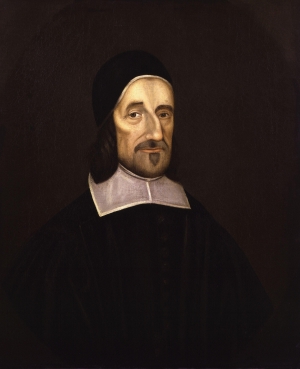1. Naturally enough, in the explanations they gave, Amyraut and Testard sought to conform their presentation and language as closely as they could to the traditional Reformed views without making an outright disavowal of their previously printed sentiments. It would be difficult . . . Continue reading →
November 2015 Archive
Arminianism Or Amyraldianism?
V. They [the Remonstrants] distinguish therefore, between the obtaining of reconciliation and the application of it. They contend that reconciliation and remission of sins is obtained for all, which yet is applied only to them that believe, that all men are given . . . Continue reading →
Burying The Lead On Baxter
There is a phrase in journalism called “burying the lead” (or, since about 1979, the cloying variant lede). The lead (lede) is the paragraph in which the most important, salient facts are contained. In the old days (c. 1975), the writer was . . . Continue reading →
Strangers And Aliens (9): The Israel Of God (1 Peter 2:9–10)
wUnder Moses and then under the Monarchy there were three special offices in Israel: Prophet, Priest, and King. These offices, of course, were given as part of the formation of God’s temporary, national people Israel, named after Jacob (Gen 32:28), whom God . . . Continue reading →
Bavinck: Amyraldianism A Species Of Rationalism
In Calvin, these two perspectives are still connected with each other, but in Reformed theology they soon split apart, and both developed in a one-sided direction. Under the influence of Socinianism and Remonstrantism, Cartesianism and Amyraldism, there sprang up the neonomian view . . . Continue reading →
Warfield: The Westminster Excluded Amyraldianism
The interest of the debate to us lies in the revelation which it gives us of the presence in the Assembly of an influential and able, but apparently small, body of men whose convictions lay in the direction of the modified Calvinism . . . Continue reading →
Charles Hodge Contra Amyraut
According to the common doctrine of Augustinians, as expressed in the Westminster Catechism, “God, having … elected some to everlasting life, did enter into a covenant of grace, to deliver them out of the estate of sin and misery, and to bring . . . Continue reading →
Packer: Owen Wrote Death Of Death Against Amyraut, Arminius, And An Anglican
The Death of Death is a solid book, made up of detailed exposition and close argument, and requires hard study, as Owen fully realised; a cursory glance will not yield much. (“READER…. If thou art, as many in this pretending age, a . . . Continue reading →
Owen Contra Amyraut On Covenant Theology
A learned man of late, out of hatred unto the Spirit of prayer, or prayer as his gift, hath endeavoured to deprive the church of God of the whole benefit and comfort of this promise (Amyrald. Præfat. in Psal.) for he contends . . . Continue reading →
John Owen’s Judgment On Amyraut’s Brief Treatise On Predestination
If Mr. Baxter go on with his intentions about a tract concerning universal redemption, perhaps we may have these things cleared; and yet, we must tell him beforehand, that if he draw forth nothing on that subject but what is done by . . . Continue reading →
Turretin: Amyraut’s Doctrine Of The Atonement Was Not Reformed
VI. Those of our ministers who defend universal grace yield to this opinion, if not entirely yet in a great measure. For as they hold a universal philanthropy (philanthrōpian) and love of God towards the human race, so they think Christ was . . . Continue reading →
Another Helpful Distinction: Filial Versus Servile Fear
I was fortunate to have been raised in a two-parent family. I had a great Dad. I had what today would be considered an “old school” upbringing. Mom did most (maybe all) of the spanking but Dad made his presence felt. There . . . Continue reading →
Perkins: Faith Is The Instrument Of Salvation
Objection 8. In respect of God, who is truth itself, we are to believe the promise in particular: yet if we respect our own unworthiness and indisposition, we are to fear and in some part to doubt. For the promise of remission . . . Continue reading →
The Synod Of Dort On Election, Conditions Of Salvation, And Fruit (2)
Does The Doctrine Of Perseverance Turn The Covenant Of Grace Into A Covenant of Works?
Here the true nature of the Remonstrant doctrine of perseverance emerges: God helps those who help themselves by cooperating with his “assisting grace.” This is quite another picture of salvation. Here God has not parted the Red Sea and led us through, by the hand, as it were (Jer 31:32; Ex 14:16). Rather, according to the Remonstrants, God has covenanted to co-act with those who do what lies within them (facientibus quod in se est, Deus non denegat gratiam). Continue reading →
Perkins: Grace Admits No Partner Or Fellow
[The Galatians] joined the works of the law with Christ and his grace in the cause of their justification and salvation. Here it must be observed that they which make a union of grace and works in the cause of justification are . . . Continue reading →
Audio: One Final, Glorious, Sovereign Word
Here is the audio from the morning sermon at Trinity OPC (Novato) from a couple of Lord’s Days ago:
An Important Distinction Between Kinds And Functions Of Conditions
When we use the word “condition,” the first sense that probably comes to mind, in English usage, is the first definition offered by the Oxford English Dictionary: “convention, stipulation, proviso.” There is another sense to the word, however, as it was used . . . Continue reading →
Turretin: Christ Is Our Substitute In Whom Mercy And Justice Meet
XXVII. The grace of God and the merit of Christ are not opposed, but subordinated because they are viewed here in different respects (kat’ allo kai allo): grace in respect of us, both in the giving of the surety and in the . . . Continue reading →
The Synod Of Dort On Election, Conditions Of Salvation, And Fruit (1)
The Reformed churches have endured discussions and disagreements about salvation (justification, sanctification, and deliverance from the wrath to come) before. Beginning in the late 16th century a Reformed minister in Amsterdam began offering significant revisions of the Reformed understanding of Scripture. Early . . . Continue reading →
Canones Synodi Dordrechtanae
JUDICIUM SYNODI NATIONALIS REFORMATARUM ECCLESIARUM BELGICARUM, Habitæ Dordrechti Anno MDCXVIII. et MDCXIX. Cui Plurimi insignes Theologi Reformatarum Ecclesiarum Magnæ Britanniæ Germaniæ, Galliæ, interfuerunt, de Quinque Doctrinæ Capitibus in Ecclesiis Belgicis Controversis: Promulgatum VI. Maii MDCXIX. PRÆFATIO IN NOMINE DOMINI ET SERVATORIS NOSTRI . . . Continue reading →





